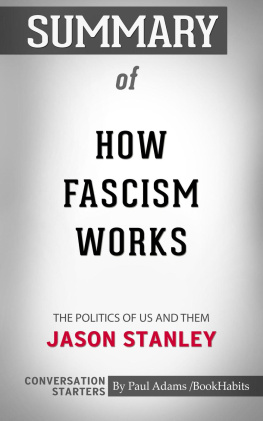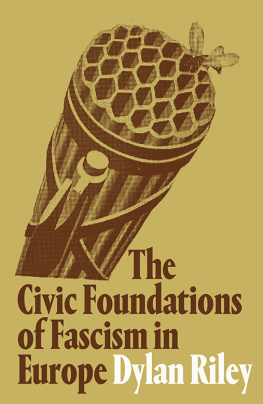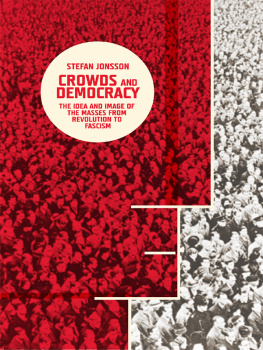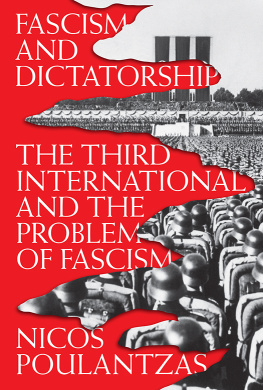Fascism and the Masses
Highlighting the mass nature of interwar European fascism has long become commonplace. Throughout the years, numerous critics have construed fascism as a phenomenon of mass society, perhaps the ultimate expression of mass politics. This study deconstructs this long-standing perception. It argues that the entwining of fascism with the masses is a remarkable transubstantiation of a movement which understood and presented itself as a militant rejection of the ideal of mass politics, and indeed of mass society and mass culture more broadly conceived. Thus, rather than massifying society, fascism was the culmination of a long effort on the part of the lites and the middle classes to de-massify it. The perennially menacing massseen as plebeian and insubordinatewas to be drilled into submission, replaced by supposedly superior collective entities, such as the nation, the race, or the people. Focusing on Italian fascism and German National Socialism, but consulting fascist movements and individuals elsewhere in interwar Europe, the book incisively shows how fascism is best understood as ferociously resisting what Elias referred to as the civilizing process and what Marx termed the social individual. Fascism, notably, was a revolt against what Nietzsche described as the peaceful, middling and egalitarian Last Humans.
Ishay Landa is Senior Lecturer of History at the Israeli Open University.
Routledge Studies in Cultural History
For a full list of titles in this series, please visit www.routledge.com
48The Problem and Place of the Social Margins, 13501750
Edited by Andrew Spicer and Jane L. Stevens Crawshaw
49Electroconvulsive Therapy in America
The Anatomy of a Medical Controversy
Jonathan Sadowsky
50A Cultural History of Sound, Memory, and the Senses
Edited by Joy Damousi and Paula Hamilton
51The Romantic Idea of the Golden Age in Friedrich Schlegels Philosophy of History
Asko Nivala
52Student Revolt, City, and Society in Europe
From the Middle Ages to the Present
Edited by Pieter Dhondt and Elizabethanne Boran
53Respectability as Moral Map and Public Discourse in the Nineteenth Century
Woodruff D. Smith
54The British Anti-Psychiatrists
From Institutional Psychiatry to the Counter-Culture, 19601971
Oisn Wall
55Cultural Histories of Crime in Denmark, 1500 to 2000
Edited by Tyge Krogh, Louise Nyholm Kallestrup and Claus Bundgrd Christensen
56Fascism and the Masses
The Revolt Against the Last Humans, 18481945
Ishay Landa
Fascism and the Masses
The Revolt Against the Last Humans, 18481945
Ishay Landa

First published 2018
by Routledge
711 Third Avenue, New York, NY 10017
and by Routledge
2 Park Square, Milton Park, Abingdon, Oxon OX14 4RN
Routledge is an imprint of the Taylor & Francis Group, an informa business
2018 Taylor & Francis
The right of Ishay Landa to be identified as author of this work has been asserted in accordance with sections 77 and 78 of the Copyright, Designs and Patents Act 1988.
All rights reserved. No part of this book may be reprinted or reproduced or utilised in any form or by any electronic, mechanical, or other means, now known or hereafter invented, including photocopying and recording, or in any information storage or retrieval system, without permission in writing from the publishers.
Trademark notice: Product or corporate names may be trademarks or registered trademarks, and are used only for identification and explanation without intent to infringe.
Library of Congress Cataloging-in-Publication Data
A catalog record for this book has been requested
ISBN: 978-0-8153-8585-1 (hbk)
ISBN: 978-1-351-17999-7 (ebk)
Typeset in Sabon
by Apex CoVantage, LLC
To Maria, Judith and Nomi
Contents
In the long process of writing this book, numerous people were greatly helpful to me.
For their various incisive suggestions, kind encouragements and useful critiques, I wish to express deep gratitude to my esteemed colleagues, Michal Aharony, Stuart Cohen, Guy Elgat, Yuval Eylon, Donny Gluckstein, Nicols Gonzlez Varela, Daniel Gutwein, Zohar Kohavi, Guy Miron, Inbal Ofer, Iris Shagrir, Alberto Spektorowski, Bernhard H.F. Taureck and Shulamit Volkov. I thank Harrison Fluss, who read the entire manuscript and made many helpful suggestions. I am very grateful to Max Novick of Routledge for his interest in this project and support in having it published. I am especially obliged to Bat-Zion Eraqi Klorman, whose generous, wise and abiding assistance and encouragement were invaluable.
Very special thanks to Luis, my Argentinean Yiddishe tate, for help beyond measure. As I was writing this book, I often felt that whatever value this study may hope to possess for understanding the horror of fascism, derives from the lessons he has given me all these years, in his infinitely kind and humane way.
Ishay Landa
Summer 2017
So I shall speak to them of the most contemptible human: and that is The Last Human. []
Nobody grows rich or poor anymore: both are too much of a burden.
Who still wants to rule? Who obey? Both are too much of a burden.
No herdsman and one herd.
Friedrich Nietzsche 1883 (1969: 4546)
The overman [] will have to do battle with two enemies: the mass and God.
The fight against the latter will not be dangerous. God is dead, isnt it so?[.] The mass [la Plebe] will pose greater obstacles to the development of the overman. The mass is too Christian and too egalitarian, and it will never comprehend that in order for the overman to ascend, a higher level of cruelty is required. [] Nevertheless, the overman will overcome both the mass and God. He will impose on all his leonine will.
Benito Mussolini 1908 (1958, vol. 1: 183)
[Nietzsches] prophecy of the Last Human has found rapid fulfillment. It is accurateexcept for the assertion that the Last Human lives longest. His age already lies behind us.
Ernst Jnger 1934 (2008: 13)
In the historiography of fascism and in the way this political movement is understood across academic disciplines, and indeed remembered by the general public, few convictions have struck deeper roots, proving more persistent and influential, than the one affiliating fascism with the masses. As conservative and liberal criticsbut also many radical onestraditionally aver ever since the 1930s, interwar European fascism was essentially a case of mass hysteria, an over-boiling of the pernicious populist tendencies inherent in mass democracy. This book will revisit the long-standing notion that fascism was mass politics at its purest, least inhibited and most vehement form. Scrutinizing such a common argument, the aim will be to show, not only that it is in some respects inadequate, as other historians have done before (see Hagtvets (1985) classical critique of mass society theories of fascism); going beyond specific reservations, it will be claimed that it is in fact useful to reverse the argument altogether and see fascism as the culmination of an effort on the part of the upper-class lites and their middle-class allies, especially since the 1848 revolutions, to subdue mass politics and its broader social, cultural and economic implications, to cut short the advances of the working class and the lower orders more generally. The notion of the masses, newly approached, can offer vital insight into the nature of one of the most fateful political and social phenomena of modern times. For that to happen, a critical confrontation will be necessary with the deeply-ingrained association of fascism with the masses.












